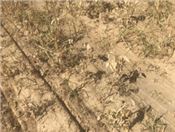New Paraquat Handling And Use Regulations

DR. JASON BOND AND DR. BEN LAWRENCE
STONEVILLE, MISS.
Paraquat dichloride is often simply referred to as “paraquat” and is one of the most common herbicide active ingredients in the United States (US-EPA 2019). The active ingredient paraquat is sold under a variety of tradenames; however, Gramoxone is the most popular product. All herbicide products containing paraquat registered in the United States are designated as Restricted Use Pesticides (RUPs) by the United States Environmental Protection Agency (EPA). This means these products may only be used by trained certified applicators.
Paraquat is essential for weed control in Mississippi agriculture, and it is utilized in preplant herbicide programs in all major row crops (Anonymous 2018). Paraquat is also used as a harvest aid in soybean. Additionally, no herbicide products containing paraquat are registered for homeowner or residential use.
Paraquat is toxic to humans if ingested (US-EPA 2019). Since 2000, multiple deaths in the United States have resulted from accidental ingestion of paraquat. Many of the reported deaths resulted from illegal transfer of paraquat to beverage containers that were later mistaken to contain drinkable liquid. Toxicity cases also indicate paraquat is corrosive to eyes and skin.
The EPA implemented new regulations and label updates in 2016 to emphasize paraquat toxicity and reduce exposure to workers who mix, load, and apply herbicide products containing paraquat (US-EPA 2019). Manufacturers were required to have updated labels that emphasize paraquat toxicity in place by November 14, 2019. These label updates include:
• Highlighting paraquat toxicity and dissemination of supplemental warning materials emphasizing risks associated with herbicide products containing paraquat.
• Restricting the use of herbicide products containing paraquat to certified pesticide applicators only.
• Requiring specialized, EPA-approved training for certified applicators who mix, load, or apply herbicide products containing paraquat.
• Implementing new closed-system packaging to prevent transfer or removal of the pesticide except directly into proper application equipment.
Under the new regulations, only certified applicators may come in contact with herbicide products containing paraquat (US-EPA 2019). Individuals may no longer mix, load, or apply herbicide products containing paraquat working under supervision of a certified applicator. For information on how to become a certified applicator in Mississippi, visit the Pesticide Applicator Certification page on the Mississippi State Extension website.
The specialized paraquat training required for certified applicators is hosted by the National Pesticide Safety Education Center (NPSEC) and can be completed at www.usparaquattraining.com. The training addresses paraquat toxicity, new label requirements and restrictions, as well as consequences of misuse of herbicide products containing paraquat. The certification is good for three years once an applicator has completed the training and scored 100 percent on the exam at the conclusion of the training video.
After completing the specialized paraquat training and successfully completing the exam, certified applicators will receive a certificate stating they have completed the requirements to be certified to mix, load, or apply herbicide products containing paraquat. Certified applicators will need this documentation and current licensing to purchase herbicide products containing paraquat. ∆
DR. JASON BOND: Research/Extension Weed Scientist, Mississippi State University
DR. BEN LAWRENCE: DREC agronomist, Mississippi State University